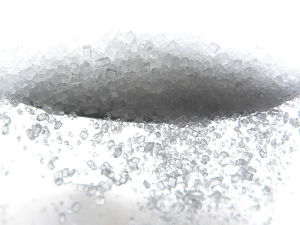Sugar Causes Inflammation
Scientists have long linked oedema, arthritis and inflammatory bowel disease with inflammation. Only recently the medical community has implicated the process to diabetes, certain cancers and other unsolvable degenerative conditions. The latest research links heart disease more to various inflammatory conditions than to high cholesterol. Researchers are doing their best to come up with anti-inflammatory drugs and other cures for this inflammation.
Rather than try to find a cure, it might be wise to find out what causes inflammation and stop the cause rather than look for a cure. There are many things that cause inflammation in the body: viral and bacterial infections, surgery, a bruise, a broken bone, allergies, vaccinations, high blood pressure, oestrogen therapy, smoking, obesity, chronic fatigue, and dental problems, among others.
[private_silver]
Biggest Offender
One of the biggest offenders of inflammation is ingestion of sugar. By sugar I mean table sugar, brown sugar, raw sugar, turbinado sugar, honey (even raw), maple sugar, corn sweetener, dextrose, glucose, fructose and any other word that ends in an “ose”, barley malt, rice syrup, liquid cane sugar, concentrated fruit juice and others. Don’t be fooled by the name organic when it applies to sugar. Sugar is sugar, organic or not, and the following will explain exactly what can happen in the body when you eat as little as two teaspoons.
Every time a person eats as little as two teaspoons we can upset our body chemistry and disrupt homeostasis, the wonderful balance in the body needed for maintenance, repair and life itself. One of the many changes this upset body chemistry causes is for our minerals to change relationship to each other.(1)(2)
No mineral is an island: minerals can only function in relation to each other. When one of the mineral levels drops in the blood stream, it’s a sure thing that other minerals cannot function as well and can become toxic or deficient.
Although calcium and phosphorus give structure to our bodies through the formation of bones and teeth, most minerals function primarily as catalysts in enzyme systems within the cells and body fluids. As enzyme catalysts, the minerals are able to help our bodies grow and maintain themselves, regulate our body processes and supply us with energy. When there are very slight changes from the normal mineral composition inside the cell, this alteration may result in profound physiological consequences, without making any appreciable difference on the total mineral makeup of the body as a whole.(3)
Enzymes
One of the body processes for which enzymes are important is digestion. Enzymes help us break our food down into simple product which can then move easily from the digestive tract to the bloodstream. Enzymes break down fat to fatty acids, carbohydrates to simple sugar and protein into first, polypeptides and then into amino acids. Unfortunately enzymes can not function without minerals. You can deplete the enzymes when you eat sugar. Therefore, when the enzymes cannot function well, all of the protein in the food does not digest. This protein gets into the blood stream as partially digested protein, or polypeptides.(4,5)
Dr William Philpott, in his book BRAIN ALLERGIES says, “One of the most important systemic functions of the pancreas is to supply proteolytic enzymes (enzymes from the pancreas that aid in the digestion of proteins into polypeptides and then amino acids) which act as regulatory mechanisms over inflammatory reactions in the body. Poor digestion of proteins to amino acids occurs as a consequence of insufficient pancreatic proteolytic enzymes. As a result, unusable inflammation evoking protein molecules are absorbed through the intestinal mucosa and circulate in the blood, reaching tissues in partially digested form.
The medical community rejected this concept for years. As the old saying goes, first they ignore it, then they ridicule it, then they call it their own. Well, that is just what they have done. They call it the leaky gut syndrome, gut permeability and/or food allergy. As partially digested protein molecules (peptides), the immune system, which protects us from foreign invaders, sees these protein molecules as foreign invaders and responds the only way it knows how with inflammation. Depending on where this partially digested protein goes in the body, inflammation can set in any organ or tissue.(6)
This foreign matter, or partially digested protein, is in particles too large to be utilized by the cells. They can not get into the cell and function. This form of food allergy can cause havoc in our blood stream.(7) One of the things these particles can do is cause the classic symptoms of allergy, the inflammatory response, the runny eyes, sinusitis, sneezing and scratchy throat.(8),(9) These particles can go to the joints, tissues or bones and cause arthritis.(lO),(ll). They can go to the nervous system and cause multiple sclerosis.(l2) Medical research shows that this foreign matter can go to the skin and cause psoriasis,(13) hives,(14), and eczema.(15) The inflammatory process takes place in all these diseases.
Acne and Water Retention
From my clinical experience, acne and water retention also are caused by food allergy. Ulcerative colitis and Crohn’s disease are also caused by undigested protein.(16) The nonusable protein can go anywhere in the blood and cause problems. At this time our immune system looks at this undigested food as a foreign invader, and our immune system comes to our defence and removes this foreign protein from our blood.(l7),(l8)
When we consume sugar over and over, we weaken our body tissues, our white blood cells and our immune system.(l9),(20) Our white cells and other tissues need protein to function optimally. The cells can not get the correct protein when it is not digested and assimilated properly.
When our body tissues and immune system are weak, we can not fend off foreign invaders. Not only are we now susceptible to degenerative diseases but also infectious diseases. Whatever infectious disease we will get depends on what bacteria or virus is in the environment, and the weakness in our genetic blueprint determines what tissue will be affected and to which degenerative disease we are susceptible.
Too Much…
Sugar in the amount that we eat today (over 150 lbs, or over 1/2 cup a day,) continually upsets our body chemistry, causes the inflammatory process and leads to disease. The less sugar you eat, the less inflammation, and the stronger the immune system to defend us against infectious and degenerative diseases.
So what is there left to eat that is sweet? Lots. Whole fruits are healthy foods for healthy people. Melons and berries have the least amount of sugar. A glass of grape, orange or apple juice has the same amount of sugar as a soft drink of the same ounces and is just as detrimental. So eat your fruit whole. A mashed sweet potato is also a sweet food and is great mixed with carob or coconut milk and grated coconut. Eat just a small portion for a low carb diet. Some whipped cream with vanilla is a great topper for fruits or sweet potatoes.
For more information on sugar’s detrimental affects, a great sugarfree recipe and more on inflammation go to www.nancyappleton.com This information came from three of Dr. Appleton’s books: STOPPING INFLAMMATION, LICK THE SUGAR HABIT and LICK THE SUGAR HABIT SUGAR COUNTER.
Author:
Nancy Appleton, Ph.D.
References
1. Dr. Albrech, 1897, University of Missouri, found that minerals worked in relation to each other in the soil, then later realized that this was the same in the body.
2. Eck, Paul, Analytical Research Lahs Inc., 2338 West Royal Palm Road, Suite F,Phoenix, Arizona, 85021.
3. Ashmead, Dewayne. CHELATED MINERAL NUTRITION, Huntington Beach, Calif.; International Institute of Natural Health Sciences, Inc., 1979.
4. Ratner B.G and Gruehl, H.L. “Passage of Native Proteins through the Normal Gastrointestinal Wall”. JOURNAL OF CLINICAL INVESTIGATION, 1934; 13:517.
5. Warshaw, A.L., Walker, W.A. and K.J. Isselbacher. “Protein Uptake by the Intestine: Evidence for Absorption of Intact Macromolecules. GASTROENTEROLOGY, 1974;;66:987
6. Philpott, W.. BRAIN ALLERGIES. New Canaan, Conn.; Keats Publishing Inc., 1980.
7. Paganelli, R., Cavagni, G. and Francesco Pallone. “The Role of Antigenic Absorption and Circulating Immune Complexes in Food Allergy.” ANNALS OF ALLERGY. 57;1986:330_336.
8.Taylor b., Norman A.P, Orgel H.A. et al., “Transient IgA Deficiency and Pathogenesis of Infantile Atopy.” LANCET 1973;2:11
9. Stevens, W.J., and C.H. Bridts. “IgG_containing and IgE_containing Circulating Immune Complexes in Patients with Asthma and Rhinitis.” JOURNAL OF ALLERGY AND CLINICAL IMMUNOLOGY. 1979;63:297.
10. Catteral, W.E. “Rheumatoid Arthritis Is an Allergy.” ARTHRITIS NEWS TODAY, 1980.
11. Darlington, L.G., Ramsey N.W. and J.R. Mansfield. “Placebo_Controlled, Blind Study of Dietary Manipulation Therapy in Rheumatoid Arthritis.” LANCET, Feb. 6, l986. 236_238.
12. Jones, H.D., “Management of Multiple Sclerosis.” POSTGRADUATE MEDICINE. May 1952;2:415_422.
13. Douglas, J.M.. “Psoriasis and Diet.” WESTERN JOURNAL OF MEDICINE 133 (Nov. 1980)450
14. Brostoff J., Carini C., Wraith D.G. et al. “Production of IgE complexes by allergen challenge in atopic patients and the effect of sodium cromoglycate.” LANCET 1979;1:1267
15. Jackson, P.G., Lessof M.H., Baker, R.W.R., et al. “Intestinal permeability in patients with eczema and food allergy.” LANCET. 1981;1:1285
16. Wright, R., Truelove, S.C. “Circulating Antibodies to Dietary Proteins in Ulcerative Colitis.” BRITISH MEDICAL JOURNAL. 1965;2:142
17. Kijak, E., Foust, G. and R. Steinman “Relationship of Blood Sugar Level and Leukocytic Phagocytosis.” SOUTHERN CALIFORNIA STATE DENTAL
ASSOCIATION JOURNAL 32;9 (Sept.1964).
18. Sanchez, A., et al. “Role of Sugars in Human Neutrophilic Phagocytosis.” AMERICA et al., AMERICAN JOURNAL OF EPIDEMIOLOGY. r1992;135(8):895_903 N JOURNAL OF CLINICAL NUTRITION. Nov. 1973. 1180_84
19. Selye, H. THE STRESS OF LIFE. San Francisco: McGraw_Hill, 1978
20. Editorial. “Depression, Stress and Immunity.” LANCET I, (1987) 1467_1468.
21. PSYCHOSOMATIC MEDICINE. 49:435 & 450. (Sept._Oct. 1987).
[/private_silver]
Tagged with: change in diet • digestion • sugar
Filed under: Digestion • Un-Healthy Foods
Like this post? Subscribe to my RSS feed and get loads more!



Leave a Reply
You must be logged in to post a comment.